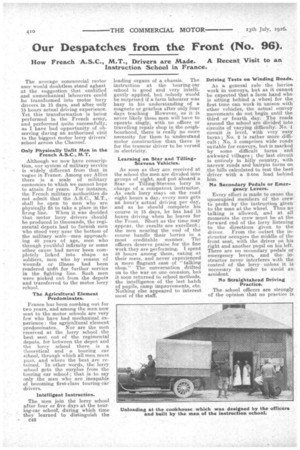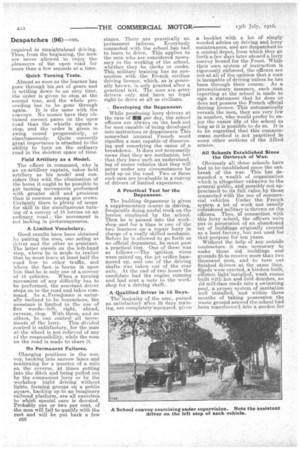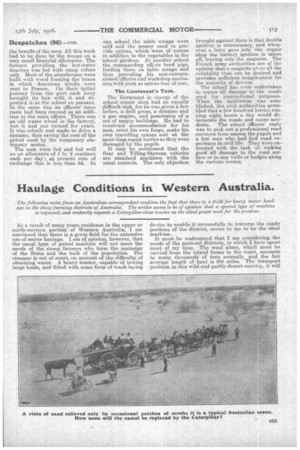Our Despatches from the Front (No. 96).
Page 16

Page 18

Page 19

If you've noticed an error in this article please click here to report it so we can fix it.
How French A.S.C., M.T., Drivers are Made. A Recent Visit to an Instruction School in France.
The average commercial motor user would doubtless stand aghast at the suggestion that unskilled and unmechanical labourers could be transformed into motor lorry drivers in 15 days, and after only 15 hours actual driving experience. Yet this transformation is being performed in the French army, and performed quite successfully, as I have had opportunity of observing during an authorized visit to the biggest motor lorry drivers' school across the Channel.
Only Physically Unfit Men in the French A.S.C., M.T.
Although we now have conscription, our system of military service is widely different from that in vogue in France. Among our Allies there is a scale of military economies to which we cannot hope to attain for years. For instance, the French military authorities do not admit that the A.S.C.,
shall be open to men who are•physically fit to take a place in the firing line. When it was decided that motor lorry drivers should he produced in thousands, the regimental depots had to furnish men who stood very near the .bottom of the military scale—men approaching 40 years of age, men who through youthful infirmity or some other cause had never been completely licked into shape as soldiers, men who by reason of wounds or illness had been
• rendered unfit for further service in the fighting line. Such men were picked out from the depots and transferred to the motor lorry school.
The Agrictiltural Element Predominates.
France has been combing out for two years, and among the men now sent to the motor schools are very few who have had mechanical experience: the agricultural element predominates. Nor are the men received at the lorry school the best sent out of the regimental depots, frit" between the depot and the lorry school there is a theoretical and a touring car school, through which all men must pass, and where the best are retained. In other words, the lorry school gets the surplus from the touring car school ; that is to say only the men who are incapable of becoming first-class touring-car drivers.
Inttlligent Instruction.
The men join the lorry school after four or five days at the tour ing-ear school, during which time they learned to distinguish the 04g leading organs of a chassis. The instruction at the touring-car school is good and very intelligently applied, but nobody would be surprised if a farm labourer was hazy in his understanding of a magneto or gearbox after only four days teaching • However, as it is never likely these men will have to operate singly, with no officer or travelling repair shop in the neighbourhood, there is really no more necessity for them to understand motor construction than there is for the tramcar driver to be versed in electricity.
Learning on Star and Tilling. Stevens Vehicles.
As soon as they are received at the school the men are divided into groups of eight, and put aboard a Star or Tilling-Stevens lorry in charge of a competent instructor. As each lorry stays on the road eight hours a day, every man gets an hour's actual driving per day, and as he should complete his course in 15 days, he has had 15 hours driving when he leaves for the Front. Short as the time may appear, the results are excellent ; the men nearing the .end of the course handle their lorries in a most creditable. manner, The officers deserve praise for the fine work they. are performing. I spent 48 hours among them, eating at their mess, and never experienced a more flagrant case of 'talking shop." The. conversation drifted on to the war on one occasion, but it soon returned to school methods, the intelligence of the last batch of pupils, camp improvements, etc. Nothing else appeared to interest most of the staff.
Driving Tests on Winding Roads.
As a general rule the lorries work in convoys, but as it cannot be expected that a farm hand who is sitting behind a wheel for the first time can work in unison with other vehicles, the actual convoy movements do not begin until the third or fourth day. The roads around the school are divided into circuits of varying difficulty. No. 1 circuit is level, with very easy turns ; No. 2 is rather more difficult; No. 3 comprises wide roads suitable for convoys, but is marked by some difficult turns and awkward villages; the last circuit is entirely in hilly country, with narrow roads and hairpin turns on the hills calculated to test the best driver with a 2-ton load behind him.
No Secondary Pedals or Emergency Levers.
Every effort is made to cause the unoccupied members of the crew to profit by the instruction given to the man at the wheel. Thus no talking is allowed, and at all moments the crew must be at the forward end of the lorry listening to the directions given to the driver. From the outset the instructor occupies the. middle of the front seat, with the driver on his right and another pupil on his left. There are no secondary pedals or emergency levers, and the instructor never interferes with the control of the lorry unless it is necessary in order to avoid an accident.
No Straightahead Driving Practice.
The school officers are strongly of the opinion that no practice is required in straightahead driving. Thus, from the beginning, the men are never allowed to enjoy the pleasures of the open roadfor more than a few seconds at a time.
Quick Turning Tests.
Almost as soon as the learner has gone through his .set of gears and is. settling down to an easy time, the order is 'given to stop at the second tree, and the whole proceeding has to be gone through again. It is the same with the convoys. No sooner have they obtained correct paces Oa the open road than the whistle signals a stop, and the order is given to swing round progressively, or simultaneously. Quite correctly great importance is attached to the ability to turn on the ordinary road in the slairtest space of time.
Field Artillery as a Model.
The officer in command, who is an ex-artillery captain, takes field artillery as his model and considers that with the elimination of the horse it ought to be possible to get turnin,g movements performed with greater skill and precision than is common among gun crews. Certainly there is plenty of scope for skill in the simultaneous turning of a convoy of 15 lorries on an ordinary road ; the movement is not lacking in picturesqueness.
A Limited Vocabulary.
Good results have been obtained by pairing the niers, one acting as driver and the other as assistant. The latter stands on the left-hand step, where he is made to realize that he must leave at least half the road free to other traffic, and 'where the fact is 'borne in upon him that he is only one of &convoy of 15'vehicles. When a turning movement of any difficulty has to be performed, the assistant driver steps on to the road and takes command. As a.Frermhman is naturally inclined to be loquacious, the assistant is limited to the use of five words—left, right, ahead, reverse, stop. With these, and no others, he can control all movements of the lorry. This divided control is satisfactory, for the man at the wheel is not relieved of any of the responsibility, while the man on the road is made to share it..
No Permanent Failures.
• Changing positions in the convoy, backing into narrow lanes and continuing for a quarter of a mile on the reverse, at times getting into the ditch and being pulled out by the companion lorry or by the workshop night driving without lights, forming groups on a public square, backing up to an imaginary railroad platform, are all exercises to which special care is devoted. Probably one or two per cent, of the men will fail to qualify with the rest and will be pub back a few C50 stages. There are practically no permanent failures. Everybody connected with the school has had to learn to drive. This applies to the men who are considered necessary to the working of the school, whether they be clerks or cooks. This military training has no connection With the French civilian driving licence, which, as is generally known, ia only granted after a practical test. The men are army drivers only, and have no legal right to drive at all as civilians.
Developing the Depanneur.
While producing lorry drivers at the rate of 111111 per day, the school officers are always on the look-out for men capable of being developed into instructors or depanneurs: This somewhat unusual French word signifies a man capableof discovering and remedying the cause of abreakdown. . It does not necessarily mean that they are mechanics, but that they have such an understanding of motor vehicles that they will never under any circumstances be held up. on the road. Two or three such men are invaluable in a convoy of drivers of limited experience.
A Practical Test for the Depanneur. • The budding depanneur is given a supplementary course in driving, frequently doing useful work on the lorries employed by the school. Then he is passed into the workshop and for a time is one of the two learners on a repair lorry in charge of a really skilled mechanic. Before he is allowed to go forth as an official depanneur, he must pass a practical test. One of these was as follows :The ignition wires were mixed up, the jet orifice hammered up, and one of the driving shafts was taken out of the rear axle. At the end of two hours the candidate had the -engine running and had sent a -note to the workshop for a driving shaft.
A qualified Driver in 15 Days. The majority of the men, passed as satisfactory after. 15 days train_ ing, are eompletely'equipped, given a booklet with a lot of simply worded advice on driving and lorry maintenance, and are despatched to • a central depot, from which they go forth a few clays later aboard a lorry convoy bound for the Front. While their own system of instrnetion is rigorously enforced, the officers are not at all of the opinion that a man is incapable of driving unless he has been through their course. As a, precautionary measure, each man
i
reporting at the school s made to sign a statement that he does or does not possess the French official driving licence. This automatically reveals the men, they are very few in number, who would prefer to enjoy the easier life of the school as long as it is possible to do so. It is to be regretted that this commonsense method is not practised in some other sections of the Allied armies.
All Schools Established Since the Outbreak of War.
Obviously all these schools have had to be established since the outbreak of the war. This has demanded a, wealth of organization which is altogether unknown to the general publass and possibly not appreciated to its full value_ by those connected with the use of commercial vehicles. Under the French system a lot of work not usually considered military is thrown on the officers. Thus, in connection with this lorry schooli the officers were put in possession of an abandoned set of buildings originally erected as a, boot factory, but not used for that purpose for ten years. Without the help of any outside contractors it was necessary to make those old buildings and grounds fit to receive more than two thousand men, and to turn out finished drivers at the same time. Sheds were erected, a kitchen built, electric light: installed, wash rooms built with hot and cold douches, an ild mill-dam made intoa swimming pool, a proper system of sanitation well installed, 'and within three months of taking possession the waste ground around the school had been transformed into a garden for
the benefit of the men. All this Work had to be done by the troops on a very small financial allowance. The furnace providing the hot-water douches was fed with camp refuse only. Most of the storehouses were built with wood forming the boxes in which American trucks were sent to Franoe. On their initial journey from the pert each lorry brought its box with it and deposited it at the school en passant. In the same way an officers' mess room had been erected as an addition to the main offices. There was an old water wheel in the factory, but it had not turned for years. It was rebuilt and made to drive a dynamo, thus saving the cost of the petrol used by the temporary stationary motor, The men were fed and fed well on an allowance of 1 fr. 2 centimes each per day ;. at present rate of exchange this is less than 9d. In
one school the table scraps were sold and the money used to provide extras' which were of course in addition to the vegetables in the school gardens. At another school the commanding offieer bred pigs, feeding them on table scraps and. thus providing his non-commissioned officers and workshop mechanics with pork as extras free of cost.
The Lieutenant's Task.
The lieutenant in charge of the school repair shop had an equally difficult task for he was given a few lathes, a drill press, a dynamo and a gas engine' and possession of a set of empty buildings. He had to construct accommodation for his men, erect his own forge, make his own travelling cranes and at the same time repair lorries as they were damaged by the pupils.
It may be mentioned that the Star and Tilling-Stevens vehicles are standard machines with the usual controls. The only objection brought against them is that double ignition is unnecessary, and whenever a lorry goes into . the repair shop the battery ignition is taken off, leaving only the magneto. The French army authorities are of the opinion that a magneto gives all the reliability that can be desired and provides sufficient complication for the majority of drivers. The school has even undertaken to repair all damage to the roads • used for instructional purposes. When the institution was established, the civil authorities grumbled that a few hundred lorries running eight hours a day would deteriorate the roads and cause acci
dents. The school officers' reply was to pick out a professional road surveyor from among the pupils and a few men who had had road experience in civil life. They were entrusted with the task of making • good all damage to the road surface or to any walls or hedges along the various routes:
























